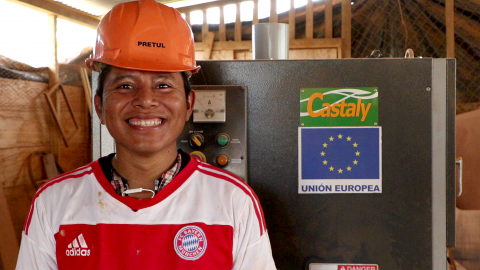RELATIONS WITH THE EU
The European Union and Guatemala
The European Union shares with its partners worldwide a commitment to the defence and promotion of human rights. It generates opportunities for development, regional integration and free trade and business cooperation agreements with Europe.
Political Relations and Human Rights
Guatemala is the largest economy in Central America, with around 16 million inhabitants. It generates one third of that region’s GDP and plays an important role in the promotion of regional integration and the development of relations between the European Union and Central America.
The European Commission, supports Central American integration and Guatemala's efforts to consolidate the rule of law.
The commission currently finances projects for the defence of human rights, food security, disaster prevention and socio-economic development. These initiatives help specific sectors such as indigenous peoples, women and youth, and are managed by national and European non-governmental organisations.
The EU is based on a strong commitment to promote and protect human rights, democracy and the rule of law throughout the world. (Article 21 of the Treaty on European Union).
The EU is convinced that sustainable international peace, development, prosperity, respect for human rights and democratic governance are fundamental to conflict resolution and are valuable bulwarks against terrorism.
Economic Relations
The European Union is the 5th destination for Guatemala's exports, through regional integration and free trade and business cooperation agreements with Europe.
As a member of the Central American Integration System (SICA), the relationship with the EU includes political dialogue, an agenda of cooperation and a favourable trade regime. This has the aim of promoting sustainable development and good governance included in the new Generalized System of Preferences (GSP+).
Trade area
Association Agreement implies the establishment of a free trade zone between Central America and the EU, the effective implementation of a Customs Union among Central American countries.
Bilateral programmes
The EU finances the AL-INVEST Regional Programme, which seeks to contribute to improving social cohesion in the region (Mexico-Central America) by strengthening SMEs, increasing competitiveness, incorporating new technologies, and improving processes.
Trade Relations
The European Union supports developing countries in their insertion into the global economy, fostering the knowledge and infrastructure necessary to expand their participation in world trade and take advantage of its benefits.
The EU is the leading donor under the World Trade Organization's Aid for Trade initiative.
An online service, the Export Helpdesk, provides exporters from developing countries with information on import requirements for a common market of 27 countries and 500 million consumers with high purchasing power. Lastly, on import requirements for the Central American market, the EU provided cooperation funds to support the development of a computerised tool called Arancel Informatizado Centroamericano (Central American Computerised Tariff), which contains the necessary customs information.
ACCESS2MARKETS
Exporting from the EU, importing to the EU... Everything you need to know: product-by-product information on tariffs and taxes, customs procedures, rules of origin, trade barriers, product requirements, statistics for all EU countries and over 120 export markets worldwide. To find out in detail visit the link: https://trade.ec.europa.eu/access-to-markets/en/home
Development Cooperation
The EU, through the European Commission and its Member States, is the main donor of development cooperation in Guatemala, with more than one billion euros (Q.12 million) in donations since the signing of the Peace Accords.
The EU is working on a strategic cooperation framework (MIP) that covers 7 years and concentrates on 3 priority sectors to unite efforts and not disperse; at the end of the 7 years, results and a positive impact can be seen.
The cooperation cycle that is currently culminating from 2013 to 2020 focusing on these sectors: support for competitiveness, food security and good governance. In addition, it has supported the defence and promotion of human rights, indigenous peoples and women victims of violence.
The new MIP 2021-2027 includes:
- Green Pact: seeks to support Guatemala in the fight against climate change, environmental protection and biodiversity.
- Sustainable inclusive economic development: supporting the economic development of the country; inclusive for the most vulnerable, rural communities, small rural entrepreneurs who can benefit from this economic growth, often concentrated in the capital.
- Institutional strengthening, good governance and human development: supporting public institutions to be more effective and improving access to and quality of the services they provide, be it education, health, water or sanitation.




